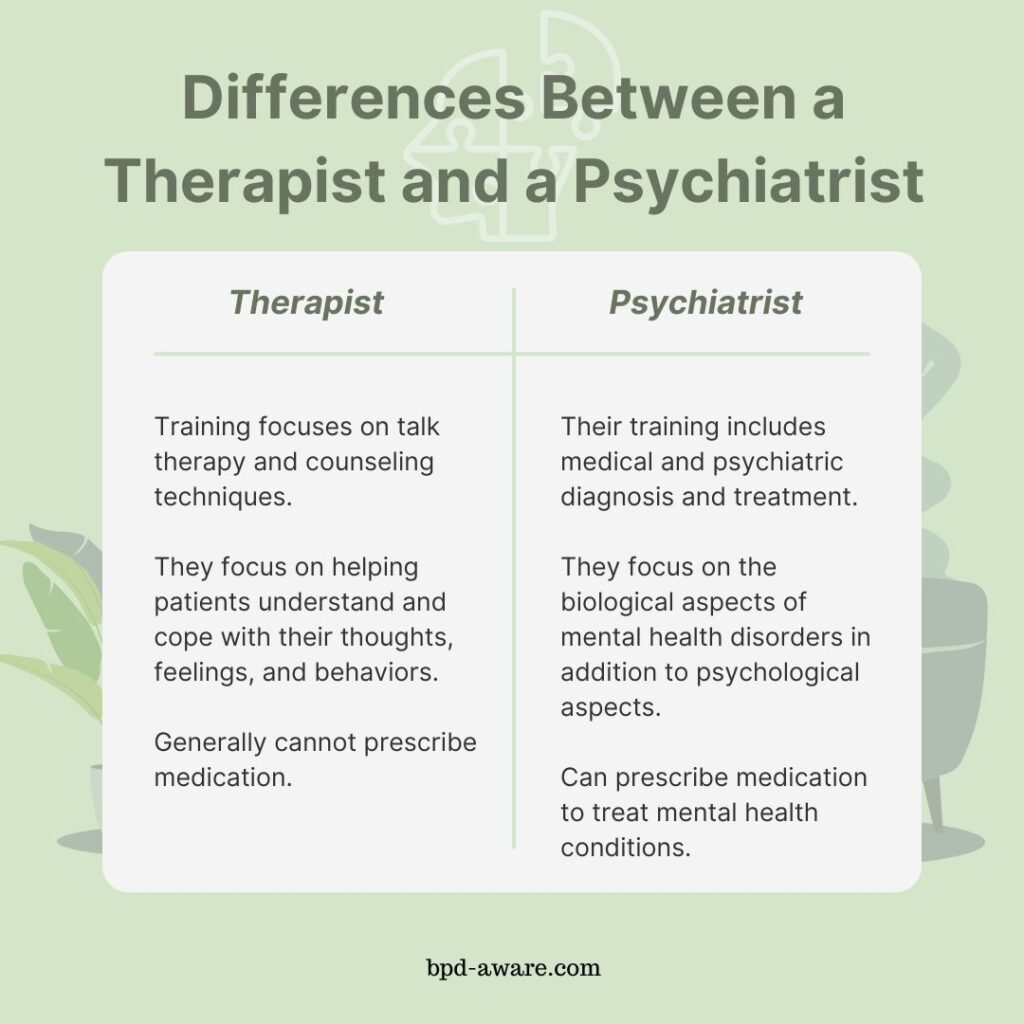If you’ve been recently diagnosed with Borderline Personality Disorder (BPD) or suspect that you might have it, there are a lot of new terms and pieces of knowledge to get to grips with. As you begin your BPD journey, your thoughts might immediately turn to the treatment available to you.
Treatment for BPD typically involves a combination of therapy and medication but this opens up its own set of questions. One of the questions I see being asked most often about therapy is “What’s the difference between a therapist and a psychiatrist?” and it’s a very valid question as most of us don’t have much experience in the realm of mental health professionals before seeking treatment.
In this article, we’ll look at the similarities and differences between therapists and psychiatrists, their roles in BPD treatment, and how they work together.
Therapists and Their Role in Treating BPD
Therapists can have various levels of education, such as a master’s degree or doctoral degree, in fields like psychology, counseling, social work, or family therapy. A master’s degree typically takes around two years to achieve and is taken after a bachelor’s degree. A doctoral degree takes four to seven years to accomplish and is taken after a master’s degree. In total, that means a therapist with a master’s degree has usually spent six years studying in their chosen field before practicing, while a therapist with a doctoral degree has typically spent ten years or more learning their chosen field.
Therapists will continue to study techniques and therapeutic practices beyond their initial education and will likely specialize in certain approaches. Some may specialize in treating certain conditions, such as Borderline Personality Disorder, while others specialize in certain types of therapy such as group therapy.
It’s important to note that therapists generally don’t have the authority to prescribe medication.
Common forms of therapy used to treat BPD include Dialectical Behavior Therapy, Schema Therapy, Transference-Focused Therapy, and Mentalization-Based Therapy.
Typically, when people talk about therapy in terms of treating BPD, they are talking about therapists rather than psychiatrists. However, psychiatrists do have their own role in treating BPD.

Psychiatrists and Their Role in Treating BPD
Psychiatrists are medical doctors who’ve completed medical school before undergoing a residency in the field of psychiatry. Their training covers the biological, psychological, and sociological components of mental health.
It takes around twelve years for someone to become a psychiatrist as they first need a bachelor’s degree before undergoing four years of medical school and a further four years of residency. That means they have studied longer than therapists, although therapists study arguably may have been more focused.
While, like therapists, psychiatrists can perform psychotherapy, their main role is typically to diagnose mental health conditions and manage treatment, particularly through medication. As they are medical doctors, psychiatrists can order tests such as brain scans and prescribe medication. They will monitor a patient’s reactions to medication and will change doses and medication types as and when required.
Who Do I See First If I Suspect I Have BPD?
Now we understand more about the similarities and differences between therapists and psychiatrists, it creates another question – who should you see first if you have BPD or suspect you have BPD?
The answer depends on the individual. It’s generally quicker and easier to see a therapist, so a therapist can often provide more immediate action. However, psychiatrists can prescribe medication and create a comprehensive treatment program for you.
Fortunately, therapists and psychiatrists often work together. Whichever you choose to see first, the odds are they will recommend or refer you to the other. Borderline Personality Disorder responds well to a combination of therapy and medication, so both the therapist and the psychiatrist have a role to play.
Before all of this though, you may want to first talk about your options with your healthcare provider/general practitioner (aka your local doctor). They can offer you advice and guidance on what your next step should be and refer you to a psychiatrist and/or therapist. Your doctor will also be able to prescribe medication if they believe it to be necessary.

How Do Therapists and Psychiatrists Work Together?
As previously mentioned, it’s common for people with BPD to have a treatment plan that includes both therapy and medication. That can mean needing both a therapist and a psychiatrist.
The majority of the treatment process will happen with the therapist. You will likely see your therapist once a week individually and once more as part of group therapy. Sometimes individual therapy and group therapy will be handled by two different therapists as group therapy is a specialization in its own right.
Your initial session with your psychiatrist might last an hour or more as they use the information you provide them to create your treatment plan, including medication. After this initial session, you might only see your psychiatrist once every few months for a much shorter session to discuss how you’re reacting to the medication. Different medications and dosages may be experimented with until a combination is found that works best for you.
Your psychiatrist and therapist(s) will communicate regularly to discuss the progress you are making. This will often be done electronically for the sake of time. Typically it’s your therapist who will instigate the communication and they will often talk to you first if there’s something particularly important that they are going to share with your psychiatrist. If, for example, you’re having an issue with your medication, it can often be easier to tell your therapist who can then flag this up with your psychiatrist.
Generally speaking, because of the time you spend together, you’ll likely develop a closer relationship with your therapist than your psychiatrist.
Final Thoughts
To sum it up, a therapist typically has a background in psychology and will handle the therapy portion of your treatment while a psychiatrist has a medical background and will handle the medication side of your treatment. Both play an important role in treating Borderline Personality Disorder.
Going into treatment can be scary as there are many unknowns, so I hope this article has shed some light on the differences between a therapist and a psychiatrist, as well as what the treatment routine looks like for someone with BPD. Having that knowledge of what to expect can ease the burden of anxiety and make taking the steps toward treatment much easier.
Sources, Resources, and Further Reading
- Guide to Psychiatry and Counseling: https://www.webmd.com/mental-health/guide-to-psychiatry-and-counseling
- What’s the Difference between a Therapist and a Psychiatrist? https://www.uopeople.edu/blog/difference-between-therapist-and-psychiatrist/
- What’s the Difference Between a Psychologist and Therapist? How to Choose: https://www.healthline.com/health/psychologist-vs-therapist
- How to Choose Between a Counselor and a Therapist:https://www.verywellhealth.com/counselor-vs-therapist-5220991
















